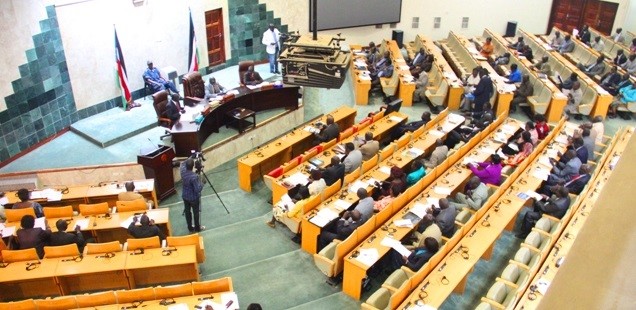South Sudan’s National Assembly in its sitting today has passed the Non-Governmental Organizations Bill (NGO), limiting the number of foreigners employed by aid organizations to 20% at all levels. The bill now awaits signature by the president.
Chairman of the Assembly Information Committee Thomas Wani said after the bill was passed, “NGOs should observe the employment of the nationals and it is put clear that at least 80 percent of the employees at all levels should be nationals and that is something normal internationally because the NGOs are coming to render services to our people.”
He stressed, “They can get only 20% experts from outside but the rest of work can be done by the nationals.”
According to a version of the bill provided to journalists by parliament today, NGOs in South Sudan shall “ensure that not less than 80 percent of the total number of staff employed in the organization are South Sudan nationals in all level (Managerial, middle and junior level).”
MP Thomas Wani denied that the bill restricts aid organizations. But he also pointed to a new banking requirement. “The bill has not restricted the operation of the NGOs. What we are after is any NGOs should open [bank] account within South Sudan unlike the ongoing situation have their account in the foreign and neighboring countries.
“No. Any NGOs coming to operate should have their account here without the interfering of the government,” Wani said.
Civil society recommendations disregarded
Beny Gideon Mabor, a member of civil society representing South Sudan Monthly Forum, said that the current version of the NGO bill passed by the national parliament contravenes South Sudan’s international obligations.
“We felt that some of our concerns… have not been included in the bill,” Gideon said.
He also complained that the bill passed through its readings in the parliament too quickly. “The bill was passed on the 6th of May in its third and when we went back and sit in South Sudan Monthly Forum, we observe some of other provisions in the bill that are necessary need to be considered in its fourth and final reading and those considerations are not considered…”
Gideon took issue with section 3 of the bill, ‘Purpose,’ which said the purpose of the bill was to provide a regulatory framework for the “registration, coordination and monitoring” of NGOs.
“For example one of the serious issues in section 3, purpose of the bill, we say the word ‘monitoring’ should be taken away because the word gives serious interpretation and should be replaced with the word ‘oversight’ because if it is monitoring we are controlling,” Gideon said.
“The second one is section ten, we are say the appointment of the commission is by the president upon the recommendation of the Minister of Humanitarian Affairs and approve by the parliament. Now the bill didn’t talk about that and also the tenure of the commission in which we proposed not more than four years,” he said.




